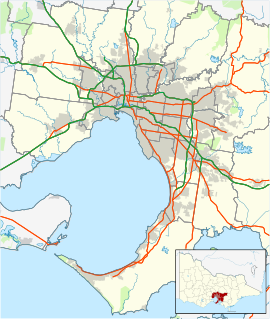Cairnlea
|
Cairnlea Melbourne, Victoria |
|||||||||||||
|---|---|---|---|---|---|---|---|---|---|---|---|---|---|

Kororoit Creek at Cairnlea
|
|||||||||||||
| Coordinates | 37°45′25″S 144°47′02″E / 37.757°S 144.784°ECoordinates: 37°45′25″S 144°47′02″E / 37.757°S 144.784°E | ||||||||||||
| Population | 8,839 (2011 census) | ||||||||||||
| Established | 1999 | ||||||||||||
| Postcode(s) | 3023 | ||||||||||||
| Location | 17 km (11 mi) from Melbourne | ||||||||||||
| LGA(s) | City of Brimbank | ||||||||||||
| State electorate(s) | Kororoit | ||||||||||||
| Federal Division(s) | Gorton | ||||||||||||
|
|||||||||||||
|
|||||||||||||
Cairnlea is a suburb of Melbourne, Victoria, Australia, 17 km north-west of Melbourne's central business district. Its local government area is the City of Brimbank. At the 2011 Census, Cairnlea had a population of 8,839.
The former Albion site became open grassland after European settlement but later, from 1939, it was a government explosives manufacturing site. The site closed in the 1990s.
The suburb is a new estate, and has only been developed since 1999, with development of the new suburb to finish in mid-2005. The suburb features several man made lakes and has implemented a suburb-wide stormwater recycling system that feeds all the lakes.
By 2011 Cairnlea is projected to have 3000 residential blocks and to have a population of more than 10000. It covers 460 hectares (2 km by 2.5 km) bounded by Station St, the Western Highway and the Western Ring Road.
Some 130ha have been set aside for public open space. Part of that process has seen two endangered species (the Plains Rice-flower and the Striped Legless Lizard) having reserves and management plans set up for their preservation.
Kororoit Creek is located on the southern border of the suburb and Jones Creek on the Northern Border. The creeks have been home to healthy populations of native reptiles for thousands of years, including Tiger snake, Eastern Blue-tongued Lizard and Eastern brown snake. Unfortunately due to development over the past 20 years, these species are now rarely seen in the area.
...
Wikipedia

